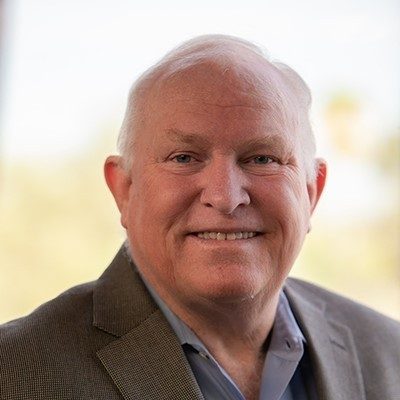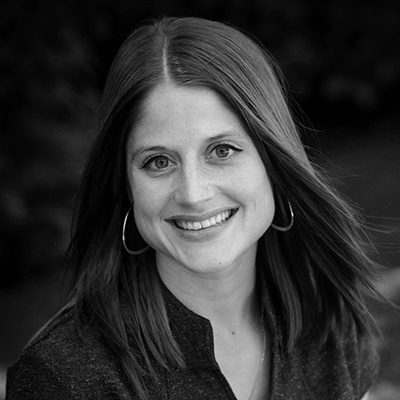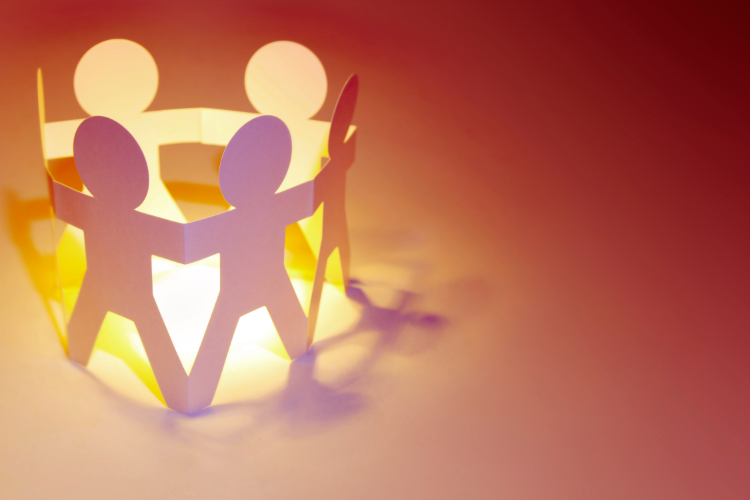The tale of “stone soup,” an old European folk story, is familiar to many people. It has many variations and iterations, and in an Eastern European version, the stone is swapped out for an ax, but the general story remains the same:
A hungry traveler passes through a town. He asks the villagers for food and a place to sleep, but the answer from everyone is the same: “We are poor, and we have no food.” In response, the traveler pulls a stone out of his bag, adds it to a pot of boiling water and begins making stone soup, claiming it will be delicious. Curious, the villagers each contribute small amounts of food to the pot, such as vegetables and meat, wanting to see the so-called stone soup come to fruition. In the end, everyone enjoys a rich and hearty meal together.
In short, stone soup is the making of something significant by accumulating many small contributions.
Bellevue University’s Human Capital Lab is taking a similar approach under the leadership of Rich Douglas, its executive director. Douglas envisions the Lab as a collaborative and dynamic entity, evolving through the collective efforts and contributions of its participants.

“I really want the community to step in and say, ‘well, we can add to that.’ And we’re not following a recipe, so they can add what they think is important,” Douglas says. “That’s what I want the lab to be: a reflection of what the human capital management and talent development community really needs. And it starts off with a solid foundation, and that’s the stone in the boiling water.”
An evolving initiative
The Human Capital Lab, originally the brainchild of previous executive director Mike Echols, was founded more than 15 years ago to be a credible, inspirational resource on how to plan, engage and enhance human capital. Throughout those first 15 years, the Lab researched and shared insights on talent management and how to fill needs and identify skill sets needed.
When Douglas took the helm at the Lab, he was presented with a unique challenge: to breathe new life into an initiative that had been a bit quiet. “I inherited a strong brand,” Douglas recalls. “It was a matter of breathing new life into its offerings that match needs in the market today.”
Today, the Human Capital Lab’s official mission is to operate a virtual community to advance human capital practice. It is completely noncommercial (no fees, membership, etc.) and committed to economic mobility and improving the lives of the national workforce through unprecedented access to education.
Journey to the Lab
Douglas’ work with Bellevue University goes back about 20 years. But before his connection to the university and eventual role as executive director of the Lab, Douglas walked an unconventional and interesting career path.
“I grew up in Southern California, and I enlisted in the Air Force when I was 18 because I needed a job,” he shares. With few opportunities available to him and no money for community college, the Air Force provided Douglas with his first education-related role: “They made me an education specialist, which is pretty ironic for a guy with no education. It was my responsibility to help people find the degree programs they were looking for, and so forth. I really got involved, as the military is, with nontraditional higher education, or distance learning, and helping people find either night schools or distance learning programs that would meet their educational needs and their career development needs.”
This role ignited his passion for learning and development, setting the stage for his future endeavors.
After completing his undergraduate degree, earning his MBA and completing various command assignments, including serving as an assistant professor at San Diego State University for four years, where he taught Air Force ROTC, Douglas retired from the Air Force in 1996 as a captain. He then began working in the private sector, first for a consulting firm and then in his own practice, while pursuing a Ph.D. in higher education specializing in nontraditional higher education. As a contractor, he established the Department of Homeland Security’s Leadership Institute, and the DHS eventually created a full-time federal role and asked him to take it over. Douglas worked as a federal officer with DHS for 13 years in various roles, but stayed in L&D the whole time.
He also earned a Doctor of Social Science in Human Resource Development, writing his thesis on what he considered to be the “very under-researched role” of the chief learning officer.
“All that time, I had done some work for Bellevue University,” Douglas says. “I taught in their Ph.D. program. I created a course and taught it in one of their MBA programs. And Mary Hawkins, the president of the university, was a colleague, and I stayed in touch with her.”
About seven years ago, Douglas and Hawkins connected and were catching up on a phone call, and she asked if he would consider working for Bellevue University as a consultant. At the time, Echols had moved on from the university, and the Lab was under the direction of Bellevue University Vice President Michelle Eppler, who launched and hosted the Lab’s first podcast season. Douglas then expressed an interest in exploring additional ways that the Lab could flourish.
A Community of Practice
Ultimately, the Human Capital Lab is focused on four key areas: human capital management, talent development, leadership (both strategic and interpersonal) and distance education. And one of the things that is central to the Lab’s operations is the formation of a Talent Development Community of Practice (CoP) — a group of professionals that includes aspiring and experienced talent developers in training administration, classroom instruction, instructional design, evaluation and talent development management. This group is for people who have made a career of talent development, as well as subject-matter experts who have come into the field either temporarily or permanently, and aims to include people at all levels, from specialists to chief learning officers.
The CoP, which is self-managed and meets virtually, provides vital peer support and learning for human capital professionals around the globe. It fosters collaboration and knowledge-sharing, allowing participants to elevate their practice and contribute to the field.
“If we can elevate their game, then we elevate their practice.”
Rich Douglas
The Lab is always seeking participants and facilitators interested in joining and helping to form and guide the direction of the CoP, Douglas notes.
“They’ve got to find their own ‘WIIFM’ — or ‘what’s in it for me,’” Douglas continues. “If you have a desire to become a recognized expert in your field, this is a great way to do it. And the opportunity to have an impact on the field may elevate your opportunities to have impacts in other areas, as well.”
Douglas says ideally the CoP will build and grow naturally through word of mouth and the passion of the facilitator and participants. As for what the CoP produces or focuses on at any given time, he has faith that the individuals in the community will identify needs and opportunities through their collaboration.
“The Community of Practice will be immediately accessible to new participants. They can join and at least be at the point of listening and understanding at the start. It’s based on the fundamentals — what challenges and opportunities people face every day on the job.”
Podcasts, partnerships and more
In addition to the formation of the CoP, another major initiative of the Lab is continuing to build on the success of its podcasts. The second season, hosted by Douglas, kicked off at the beginning of June and features conversations with education, organization and industry leaders, and practitioner guests who share insights about the impact of learning, as well as ideas or angles that could be of interest to other practitioners.
“The idea is to get ideas out there to not only promote the individual with the ideas but also the ideas themselves,” Douglas explains.
There are two podcasts per month, creating a steady stream of valuable content for the community.
A third focus area for the Lab is facilitation of partnerships between doctoral students and employers, providing real-world research opportunities that benefit both parties.
“Bellevue University’s doctoral programs cater to working adults, and the research to earn them needs to be done in the workplace,” Douglas says. “Well, what if you work for a living in a place that isn’t a place you can use as a lab? We’ll identify hosts for that. We’ll identify people who have researchable challenges or opportunities who would benefit from having a smart, dedicated individual work on that as a part of their thesis or dissertation.”
Douglas envisions this working like a meetup, a place where students can post their research interests and employers can post their challenges, looking for certain people in certain areas that might be interested in doing practical, hands-on work.
“I think there’s value in matching these groups up,” he continues. “From the university standpoint, we know the need is there and we know from the history of the Lab and current conversations that employers are interested in this assistance and point of view.”
Like everything else associated with the Lab, there will be no cost involved for those students or employers who participate.
“We expect it to be mutually beneficial and for the motivation to be that both sides experience a win-win out of that,” Douglas says.
Written in pencil
The Lab has additional goals and work it is doing. Douglas curates content on the website related to talent development in both the scholarly and professional areas. He publishes a monthly blog, as well as a monthly review of trade magazine articles, academic articles and books to help human capital and talent development practitioners and scholars excel and evolve in their profession.
“Another area we will curate over time is to give people the opportunity to publish white papers on our website – to put their knowledge or information out there. We’ll be the forum to do that and it’ll be loosely vetted. I’m not talking about a peer-reviewed journal so much as a platform. And that’s something that will evolve over time.”
And in terms of how they will track and evaluate their progress, Douglas intends to rely most on the philosophy of developmental evaluation, an approach outlined by author Michael Quinn Patton in his book, “Developmental Evaluation: Applying Complexity Concepts to Enhance Innovation and Use.”
“Developmental evaluation doesn’t say, did we reach those goals we set out a year ago? It says, where are we? And are we doing what we should be doing?” Douglas says. “You don’t know where you’re going to end up. So you’ve got to be able to evaluate things that are more free-floating. Because if you’re stuck on where you thought you were going and the circumstances are different, you’ll end up nowhere. Instead, evaluate constantly. Try new things.”
Douglas stresses that while the Lab is an evolving concept, he doesn’t want that to be confused with being irresolute.
“There’s an old saying in business: Things that aren’t worth doing are not worth doing well. We’re going to see which things resonate and stick. Then we’ll establish milestones, goals and some sort of targets.”
Community is key
The Human Capital Lab is an evolving, vibrant, impactful community dedicated to elevating human capital management and talent development. And while it will continue to develop and evolve, its current initiatives, like the Community of Practice, podcasts, doctoral research partnerships and more, are already allowing the Lab to serve as a space for collaboration, innovation and professional growth.
As Douglas puts it, “If we can elevate their game, then we elevate their practice.”
With this philosophy at its core, the Human Capital Lab is making significant contributions to the field and fostering a thriving community of interested and passionate practitioners.
Bellevue University’s Human Capital Lab is a corporate member of BetterWork Media Group. Learn more about the Human Capital Lab by accessing BetterWork Media Group’s Corporate Member Directory.
















